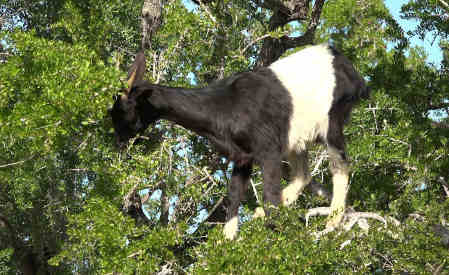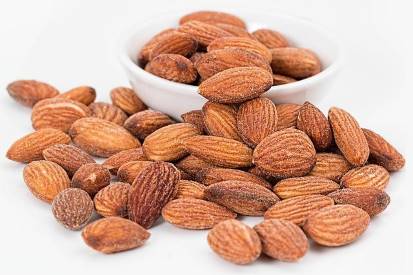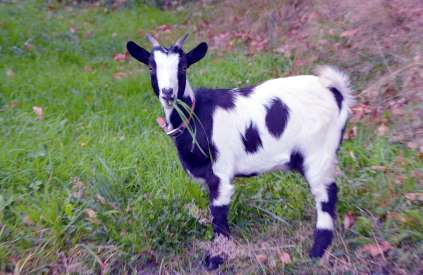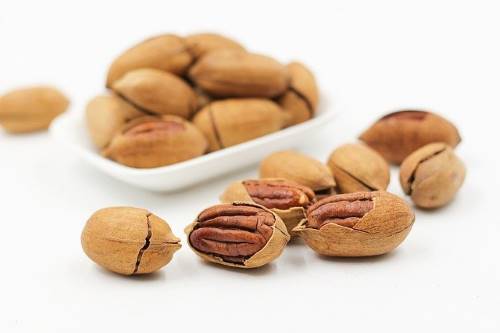Almonds. Whenever I open a pack, my goats’ ears perk up, and they trot over with eager anticipation. Can goats eat almonds? The short answer is yes, but there’s more to the story. As a goat owner, I’ve often explored what treats are both safe and beneficial for these delightful creatures.
Just like us, goats have dietary needs and preferences, and while a little almond snack can be a delightful treat, it’s vital to ensure it’s not detrimental to their health. The crunch and taste might be an instant hit, but understanding the nutritional implications is paramount.
This article delves into the nuanced relationship between goats and almonds, exploring the benefits and potential pitfalls. Whether you’re a seasoned goat owner or just starting your journey, this guide will equip you with the knowledge to keep your goats happy and healthy.

Can goats eat almonds?
First, it’s important to understand that almonds are not a natural part of a goat’s diet. Goats are herbivores, meaning their stomachs are designed to digest plants – not nuts.
However, this doesn’t mean that goats can’t eat almonds. In moderation, almonds can make a healthy and delicious treat for your goat. Just introduce them slowly and in small quantities first, so you don’t upset your goat’s stomach.
Secondly, it’s worth noting that not all goats will enjoy eating almonds. Just like people, different goats have different preferences. Some goats will love the taste of almonds and gobble them up as soon as they’re given a chance, while others will turn their noses up at them completely.
There’s no way to predict how your goat will react to trying almonds until you give it a try.
[GoatAffiliate]
The benefits of eating almonds for goats
Almonds are a nutritious and delicious treat for your goats. They are packed with nutrients essential for goat health, including protein, healthy fats, vitamins, and minerals. Here are five compelling reasons to start feeding your goats almonds today.
Packed with protein
One of the main benefits of almonds is that they’re packed with protein. Goats need protein to build muscle, so feeding them almonds will help them stay strong and healthy.
Almond meal is a great way to introduce almonds into your goats’ diet. You can either feed it to them as is or use it as an ingredient in other recipes.
Rich in healthy fats
Another benefit of almonds is that they’re rich in healthy fats. Healthy fats are important for goats because they help them absorb certain vitamins and minerals. They also provide energy and help keep their coat healthy and shiny.
You can find almond butter at most grocery stores or make your own by grinding up whole almonds in a food processor. Check the label when buying almond butter to ensure it doesn’t contain any added sugar or salt, which can be harmful to goats.
High in vitamins and minerals
Almonds are a good source of vitamins and minerals. They are high in vitamin E, which is an important antioxidant. Vitamin E helps protect cells from damage, and it helps keep the immune system strong.
Almonds are also a good source of selenium, another important antioxidant. Selenium helps protect cells from damage and has been shown to help reduce the risk of cancer.
Help prevent diseases
Almonds can also help prevent diseases. One study found that feeding goats almond skin extract helped protect them against Pasteurella multocida, a bacteria that can cause pneumonia.
Almonds are also a good source of fiber, which can help improve digestion and prevent gastrointestinal problems.
Almonds are delicious
Another reason to feed your goat almonds is that they love the taste! Goats are particularly fussy eaters, but most will happily munch on a couple of almonds as a treat.
Almonds are a great option if you’re looking for a way to add some variety to your goat’s diet or want to give them a delicious treat.
Things to watch out for when feeding almonds to goats

Before you start feeding your goats almonds, there are a few things you need to keep in mind.
Almonds are high in fat
While this may not seem bad at first glance, it’s important to remember that too much fat can lead to digestive issues in goats. If you decide to feed your goats almonds, be sure to do so in moderation and keep an eye out for any potential digestive problems.
Almonds are high in phosphorus
Phosphorus is an essential mineral for goats (and all other animals), but too much phosphorus can lead to health problems such as kidney disease. If you’re going to feed your goats almonds, be sure to balance their diet with other foods high in calcium, such as hay or grass.
Almonds contain cyanide
Cyanide is a poison that can kill goats (and other animals) if consumed in large quantities. However, the cyanide content of almonds is relatively low, and almonds fed in small quantities pose little risk. Still, it’s important to be aware of the potential danger and monitor your goats closely if you decide to add almonds to their diet.
How often should goats eat almonds?
Deciding on the frequency of feeding almonds to goats is crucial for their well-being. While these nuts are packed with nutrients, it’s essential to remember that moderation is key to prevent any digestive complications. A safe approach is to offer goats 1-2 almonds daily, ensuring they don’t consume an excess amount.
As with any dietary addition, observing your goat’s reaction and health is essential. Changes in behavior or digestion may signal that adjustments are needed. And, as a best practice, always consult with a veterinarian prior to making significant alterations to your goat’s diet.
How to prepare almonds for feeding to goats

Almonds are a nutritious and delicious treat for goats, and they’re also a great source of essential vitamins and minerals. However, before you feed almonds to your goats, there are a few things you need to do to prepare them.
Step 1: Remove the skins from the almonds. You can do this by soaking the almonds in water for 24 hours, then rubbing the skins off with your fingers.
Step 2: Chop the almonds into small pieces. This will make them easier for your goats to eat and digest.
Step 3: Add the almonds to your goat’s food or hay. You can also offer them as a treat, but be sure to limit the amount you give so that your goat doesn’t get too much of a good thing!
Can baby goats eat almonds?
Yes, baby goats can eat almonds. However, you should introduce them slowly to the nuts, as they may be more likely to experience digestive problems.
Start by offering a few small pieces of almond and see how your baby goat reacts. If they seem to tolerate them well, then you can gradually increase the amount you give.
What parts of the almond tree are safe for goats?

The almond tree, like many trees, consists of various parts – from its leaves and bark to the actual almonds themselves. For goat owners considering the almond tree as a potential source of food or foraging for their animals, it’s essential to discern which parts are safe.
Leaves
Generally, the leaves of the almond tree are safe for goats to consume. Goats are natural browsers and enjoy a variety of leaves in their diet. However, excessive consumption of any one type of leaf can lead to digestive upsets, so it’s always good to ensure a varied diet.
Branches and Bark
Goats are known to nibble on bark and branches, and the almond tree’s bark is not toxic to them. Chewing on branches can also help goats naturally trim their teeth, which continuously grow.
Almonds
As previously discussed, the almond nut itself is safe when given in moderation. It’s packed with nutrients but also high in fats. Overconsumption can lead to digestive problems.
Flowers
There isn’t conclusive evidence to suggest that almond tree flowers are harmful, but it’s always best to proceed with caution. While goats might be curious and nibble on flowers occasionally, they shouldn’t make up a significant portion of their diet.
Roots
It’s uncommon for goats to dig up and chew on roots, and generally, they should be discouraged from doing so. The nutritional value isn’t significant, and there’s potential for ingesting soil-borne pathogens or contaminants.
What other nuts and seeds can goats eat apart from almonds?

Apart from almonds, many goat owners wonder about other nuts and seeds that can be introduced into their goats’ diet. These potential additions can offer varied nutrition and taste profiles, making mealtimes more enjoyable for our hoofed friends. Here’s a closer look at five commonly considered nuts and seeds:
Peanuts
Peanuts are generally safe for goats to eat. They are a good source of protein and can be a tasty treat. However, just like with almonds, it’s essential to feed peanuts in moderation due to their high fat content. Ensure that the peanuts are unsalted and free from any additives or flavorings.
Read More: Can Goats Eat Peanuts? Great Benefits In Moderation
Acorns
While acorns are often abundant in regions with oak trees, they contain tannins that can be toxic to goats in large quantities. Some goats might naturally avoid them due to their bitter taste, but if consumed in excess, acorns can lead to kidney damage or other health issues.
If your pasture has a significant number of oak trees, it might be a good idea to monitor the acorn consumption of your goats, especially during the fall when acorn drop is at its peak.
Read More: Can Goats Eat Acorns? 5 Important Benefits
Sunflower Seeds
Sunflower seeds are a fantastic treat for goats. They are rich in essential fatty acids and vitamins that can promote a healthy coat and overall well-being. They can be integrated into a goat’s diet in moderation and can also serve as a top dressing for their primary feed to encourage eating.
Read More: Can Goats Eat Sunflower Seeds? 6 Awesome Benefits
Walnuts
Walnuts can be given to goats but in limited quantities. While not inherently toxic, they do have a higher fat content. Overconsumption can lead to weight gain and other health complications. As always, it’s vital to ensure they are free from mold, as moldy walnuts can be harmful.
Read More: Can Goats Eat Walnuts? Simple Answer & Feeding Tips
Pecans
Pecans, much like other nuts on this list, are safe but should be given in moderation. Their high fat and calorie content can quickly add up. However, as an occasional treat, pecans can be a delicious snack that goats will love.
Read More: Can Goats Eat Pecans? Simple Answer & Feeding Tips
Can goats eat almonds – final thoughts
In conclusion, yes, goats can eat almonds – but there are a few things that you need to keep in mind first. Give them only a few at a time, ensure they’re unsalted and fresh, and monitor their intake so they don’t consume too much fat. Follow these guidelines, and your goats can enjoy this tasty treat.
